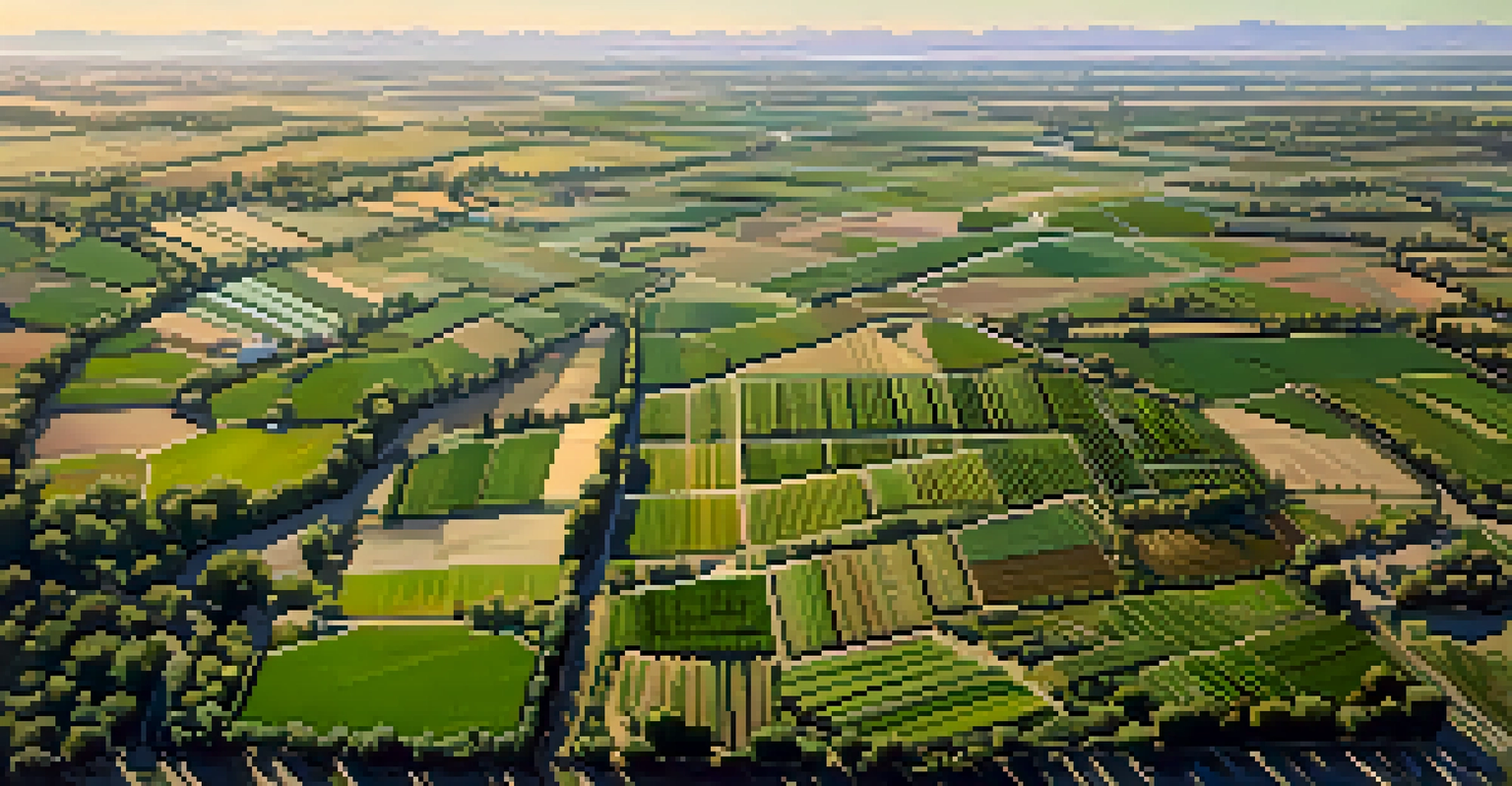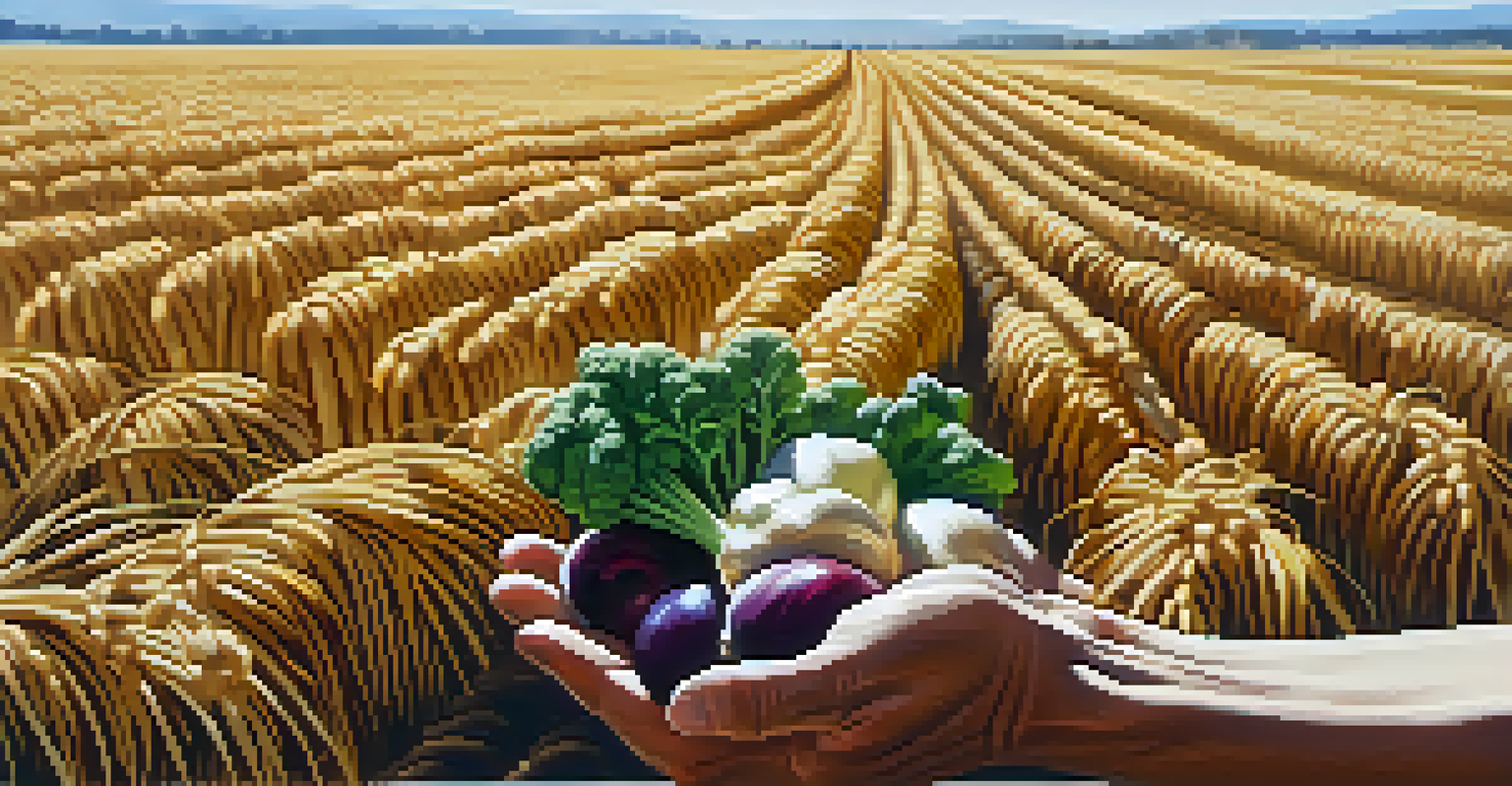The Impact of Agriculture on Sacramento's Historical Growth

Early Agricultural Roots in Sacramento's Development
Sacramento's history is deeply intertwined with agriculture, dating back to its founding in 1848. The region's fertile soil and favorable climate attracted settlers eager to establish farms. These early agricultural endeavors laid the groundwork for Sacramento's growth as a vital hub for food production in California.
Agriculture is the foundation of civilization and any stable economy.
As gold was discovered in the nearby Sierra Nevada, Sacramento became a key supply point for miners, further boosting its agricultural significance. The influx of people required a steady supply of food, which local farmers were happy to provide. This symbiotic relationship between agriculture and settlement played a crucial role in the city's early economic development.
The establishment of the California Agricultural Society in 1854 marked a pivotal moment for Sacramento, as it highlighted the importance of agriculture in the region. This organization promoted agricultural fairs, showcasing local produce and livestock, which not only celebrated farming but also drew attention to Sacramento as a center for agricultural innovation.
Transportation Innovations and Agricultural Growth
The development of transportation systems significantly impacted agricultural expansion in Sacramento. The construction of railroads in the late 19th century facilitated the movement of goods, allowing farmers to reach broader markets. This connectivity transformed Sacramento into an agricultural powerhouse, as local farmers could now sell their products beyond regional boundaries.

Moreover, the establishment of the Sacramento River as a transportation route played a key role in this growth. Farmers utilized the river to ship their goods, further enhancing the economic viability of agriculture in the area. The combination of rail and river transport ensured that Sacramento's agricultural products reached consumers efficiently and effectively.
Agriculture's Historical Significance
Sacramento's agricultural roots date back to its founding, serving as a vital hub for food production and economic growth.
These transportation innovations not only benefited local farmers but also attracted new settlers seeking opportunities in agriculture. As access to markets improved, more individuals were drawn to Sacramento's fertile lands, leading to a population surge that fueled the city's growth and development.
The Role of Irrigation in Agricultural Success
Irrigation played an essential role in shaping Sacramento's agricultural landscape. The construction of canals and levees allowed farmers to harness the region's abundant water resources, enabling them to cultivate crops year-round. This engineering feat was pivotal in maximizing agricultural output and ensuring consistent food supply.
The future of agriculture is not about technology, but about understanding the complexities of nature.
As irrigation projects expanded, the variety of crops that could be grown in Sacramento increased dramatically. Farmers started to experiment with different crops, including fruits, vegetables, and grains, which diversified the local economy. This agricultural diversification not only supported the local community but also positioned Sacramento as a significant agricultural exporter.
However, the reliance on irrigation also brought challenges, such as water management issues and environmental concerns. Balancing agricultural needs with sustainable practices became crucial, as the city's growth continued to be tied to its agricultural success.
Agriculture's Influence on Sacramento's Economy
Agriculture has long been the backbone of Sacramento's economy, contributing significantly to job creation and revenue generation. The agricultural sector encompasses a wide range of activities, from farming and food processing to distribution and retail. This economic diversity has helped Sacramento weather various economic downturns over the years.
The local economy benefits not only from the direct impact of agriculture but also from ancillary industries that support it. Businesses such as equipment suppliers, transportation services, and agricultural research institutions thrive alongside farming operations, creating a robust economic ecosystem. This interconnectedness demonstrates how agriculture is a vital component of Sacramento's economic health.
Transportation Boosts Farming Success
Innovations in transportation, including railroads and river routes, enabled local farmers to expand their markets and enhance agricultural productivity.
Furthermore, the city's agricultural heritage is celebrated through various events and festivals, such as the California State Fair, which showcases local produce and draws visitors from afar. These events not only promote local agriculture but also stimulate tourism, further solidifying the importance of agriculture in Sacramento's economic landscape.
Cultural Impact of Agriculture on Sacramento
The cultural fabric of Sacramento is woven with threads of agricultural heritage. Local cuisine often features farm-fresh ingredients, celebrating the region's bounty and fostering a strong farm-to-fork movement. This culinary focus not only enhances the dining experience but also promotes awareness of local farming practices.
Additionally, agriculture has influenced the community's identity and values. Farmers' markets and community-supported agriculture programs create connections between consumers and producers, emphasizing the importance of sustainability and local sourcing. These initiatives foster a sense of community, encouraging residents to support local farmers and understand the significance of agriculture in their everyday lives.
Cultural events, such as harvest festivals and agricultural fairs, further highlight the celebration of Sacramento's agricultural roots. These gatherings bring people together, allowing them to appreciate the hard work of farmers and the importance of agriculture in shaping the region's identity.
Challenges Faced by Sacramento's Agricultural Sector
While agriculture has been a cornerstone of Sacramento's growth, it faces numerous challenges in the modern era. Urbanization and population growth have led to increased pressure on agricultural land, often resulting in the loss of valuable farmland. Balancing development and agricultural needs is a complex issue that city planners continue to grapple with.
Additionally, climate change poses significant risks to agricultural productivity. Farmers are increasingly facing unpredictable weather patterns, water scarcity, and the threat of pests and diseases. These environmental challenges require innovative solutions and adaptive strategies to ensure the sustainability of Sacramento's agricultural sector.
Challenges and Future of Agriculture
Modern challenges like urbanization and climate change necessitate innovative strategies to ensure the sustainability and competitiveness of Sacramento's agricultural sector.
Lastly, the economic landscape is evolving, with competition from larger agricultural producers and imported goods. Local farmers must navigate these challenges while remaining competitive, leading to discussions about the importance of supporting local agriculture and promoting sustainable practices within the community.
Future of Agriculture and Sacramento's Growth
Looking ahead, the future of agriculture in Sacramento appears promising, yet requires adaptability and innovation. Advances in technology, such as precision farming and automation, hold the potential to increase efficiency and sustainability in agricultural practices. Embracing these innovations can help local farmers thrive in an ever-changing market.
Moreover, the growing emphasis on sustainability and organic farming presents new opportunities for Sacramento's agricultural sector. Consumers are increasingly seeking fresh, locally sourced produce, which can drive demand for sustainable practices. This shift not only supports local farmers but also aligns with broader environmental goals.

Ultimately, the relationship between agriculture and Sacramento's growth will continue to evolve. By prioritizing sustainable practices and embracing technological advancements, Sacramento can preserve its agricultural heritage while paving the way for a vibrant future that benefits both the local economy and the community.